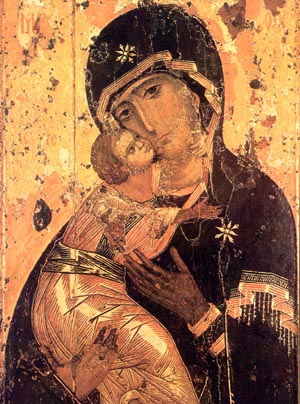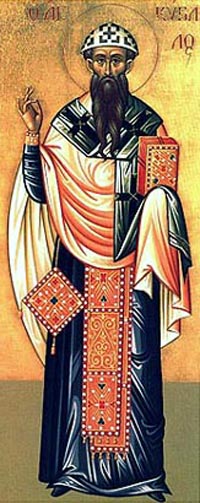 |
The Saint of the Day
St. Cyril of Alexandria, February 9
Prof. Plinio Corrêa de Oliveira
Biographical selection:
St. Cyril, Patriarch of Alexandria, strove to win back the heretic Nestorius by letters, in which his personal meekness is rivaled only by his vigor and breadth of doctrine. But Nestorius was obdurate. Since he had no argument in response, he began to make personal complaints against the Patriarch.

St. Cyril defended Mary as Mother of God against the heretic Nestorius
|
As always happens, there were pacifists who, although they did not accept Nestorius’ errors, thought it would be best not to reply to him for fear of further embittering him, increasing the scandal, and wounding charity. In response to this, Cyril criticized those who were more afraid of affirming the truths of the Catholic faith than of falling into heresy:
“What! Nestorius dares to suffer men to say in public and in his presence that he who calls Mary the Mother of God is to be anathema! He hurls his anathema, by means of his partisans, at us, at the other Bishops of the Catholic Church, and at the ancient Fathers, who in all ages and places in one accord have acknowledged and honored the holy Mother of God! And have we not the right to repay him in his own coin and say, ‘If anyone denies that Mary is the Mother of God, let him be anathema’? ….
“If our fear of some disturbance is stronger than our zeal for God’s glory and thus prevents us from speaking the truth, how shall we dare in the presence of the Catholic people to celebrate the holy martyrs, whose glory lies in the very fact that by their lives they made example of the words: ‘To fight for justice even unto death’?”
Comments of Prof. Plinio:
The text is magnificent! Just to situate you a bit in those times, let me say that St. Cyril lived in the fifth century and combated the heresy of Nestorius, who denied the union between the humanity and divinity of Our Lord Jesus Christ, and thus, the divine motherhood of the Blessed Virgin Mary.

The moderates hated St. Cyril because he did not compromise
|
In the first centuries of the Church, there were various heretics who combated the dogmas of the divinity of Our Lord Jesus Christ. Some affirmed that He was only man and not God; others stated that He was God but not man. Both denied that He is man and God. Either way, the heresy tried to shake the Catholic belief that Our Lord is true God and true man. The heresy of Nestorius denied the hypostatic union of the divine and human natures in Our Lord. He affirmed that there would have been two distinct persons, that of God and that of the man Jesus Christ. This man would not have been God, but only joined by a moral union to God, like a kind of super-saint. As a consequence Our Lady would have been only the mother of the man, not the mother of God. Therefore, her mission would be greatly reduced.
St. Cyril and the good Catholics defended that Our Lord was both God and man. The heretics sustained the opposite. The false middle, the ones who were partisans of ecumenism and wanted to dialogue between the two positions, were of the opinion that it was better not to defend the good position. They argued that this would irritate the adversaries, make it more difficult to convert them, and violate charity. These “moderates” were against St. Cyril because the Saint attacked the heretics.
I ask you if this doesn’t remind you exactly of the reactions of many “moderates” of our days who criticize our work. We should not attack the heretics, communists, and progressivists, but start a dialogue with them. To attack them would be unproductive, it would irritate them, etc. Actually, this kind of “moderate” corresponds to those of whom Scripture says: “I would that thou were hot or cold. But because thou art lukewarm and neither cold nor hot, I will vomit thee out of my mouth.” (Re 3:16) That is, if you would accept either the truth or the error, you would be consistent, but since you will not be on either side, you cause me nausea. These are the ones who are hated by God, those whom He vomits from His mouth, those who elicit that particular type of horror that causes queasiness.
These are the worst people, the ones who do the most harm to the good cause, because they present themselves to the average Catholics claiming to be Catholic, but warning them against following the ones who took the good position. The moderates say they are exaggerated in their views, etc. It is thanks to these people that the numbers of real fighters for the Catholic cause is much less than it should be.
The best support for error is not given by those who clearly defend that error, but by those who apparently profess the truth – but protect the error. They are the “fifth column” that prepares the future advance of the enemy. They attract divine wrath more than the outright evil people do.
If we want to be like Our Lord Jesus Christ, we should have the same repulsion for this kind of soul that He has. We should feel nausea when hearing the arguments of such “moderates.” It is not enough to love the good; we must also reject those who favor evil. A rejection similar to that of Our Lord, who had a loathing that caused a nausea. If we do not have such sentiment, we should pray and make a frequent ejaculation like the one we find in the litany of the Sacred Heart: “Sacred Heart of Jesus, make my heart like unto Thine.”
Let us ask St. Cyril of Alexandria through the intercession of Our Lady to give us a just indignation and revulsion toward such a hypocritical position.


  | | Prof. Plinio Corrêa de Oliveira | |
The Saint of the Day features highlights from the lives of saints based on comments made by the late Prof. Plinio Corrêa de Oliveira. Following the example of St. John Bosco who used to make similar talks for the boys of his College, each evening it was Prof. Plinio’s custom to make a short commentary on the lives of the next day’s saint in a meeting for youth in order to encourage them in the practice of virtue and love for the Catholic Church. TIA thought that its readers could profit from these valuable commentaries.
The texts of both the biographical data and the comments come from personal notes taken by Atila S. Guimarães from 1964 to 1995. Given the fact that the source is a personal notebook, it is possible that at times the biographic notes transcribed here will not rigorously follow the original text read by Prof. Plinio. The commentaries have also been adapted and translated for TIA’s site.
|
Saint of the Day | Home | Books | CDs | Search | Contact Us | Donate

© 2002- Tradition in Action, Inc. All Rights Reserved
|
 |

|